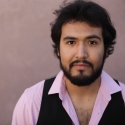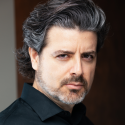Beyond Downtown

|
Manfred AnayaScrawny Coyote The Coyotes & The Rabbits |
Praised for his “wonderful lyric tenor” (BizJournal Reviews) and “standout” performances (Parterre Box), tenor Manfred Anaya is quickly gaining recognition for his versatile performances. As a young artist, he trained with Des Moines Metro Opera and Opera Theatre of Saint Louis.
Anaya has appeared as Gastone in La Traviata with Dayton Opera and Telamone in Ercole su’l Termodonte with Pacific Opera Project. Additionally, he was the tenor soloist in Beethoven’s Ninth Symphony with the South Bay Wind Ensemble. An alumnus of Cincinnati Conservatory of Music, he portrayed Doctor Caius in Falstaff and the Chevalier de la Force in Dialogues of the Carmelites. In the upcoming season, he will debut as Don Basilio in The Marriage of Figaro with Opera Santa Barbara.

|
Mauricio PerusquiaLoco Coyote The Coyotes & The Rabbits |
Mauricio Perusquia, baritone, is a rising performer with recent performances including Papageno in The Magic Flute with Arizona Lyric Theatre, Escamillo in Carmen with Chandler Opera, and Guglielmo in Così fan tutte at FIO Mondo in Italy. He performed with Arizona Opera’s OperaTunity Program, bringing music to Phoenix-area schools, and participated in El Paso Opera’s Curbside Opera Initiative. Perusquia has performed in new works like El Paso Opera’s Frida and Arizona Opera’s Silent Night, as well as standard repertoire such as La Traviata and The Barber of Seville. He holds an MM in Opera Performance from Arizona State University.

|
Jenny Madruga ChavezChiquita Rabbit The Coyotes & The Rabbits |
Chavez is a multifaceted artist and dedicated community leader, known for her roles as a wife, mother, opera singer, voice teacher, and business owner. With over 10 years of experience serving the Arizona community, she brings a wealth of knowledge and passion to her endeavors.
As the Executive Director and Founder of Arizona Lyric Theatre, Chavez is committed to fostering a vibrant arts community and empowering aspiring artists to reach their full potential. She is a proud student of Stephanie Weiss and holds a Masters in Vocal Performance, enriching her singing career with standout performances as Atalanta in Xerxes and Nora in Riders to the Sea.
Chavez began her journey with Arizona Opera as Malla in A Little Night Music by Stephen Sondheim in 2022 and has also sung in the Arizona Opera chorus for Tosca and Don Giovanni. She is excited to now be playing Chiquita Rabbit in Hector Armienta’s The Coyotes and the Rabbits in fall 2024!
In addition to her captivating performances, Chavez is also an accomplished voice and piano teacher, mentoring students of all ages from 5 to 65. Her dedication to nurturing young talent extends beyond the stage, as she has made significant contributions to music education through teaching and directing musicals such as Les Misérables: School Edition, The Little Mermaid, Lion King, and Into the Woods Jr.
Chavez’s entrepreneurial spirit shines through her ownership of Sing Pretty Designs, a creative venture where she designs opera-inspired merchandise for the modern singer. With her diverse skill set and unwavering passion for the arts, Jenny Madruga Chavez continues to make a meaningful impact in the Arizona arts community and beyond.

|
Danielle CorellaBanana Rabbit The Coyotes & The Rabbits |
Dramatic Mezzo-Soprano, Danielle Corella, is a 7th generation Arizona native. Most recently she performed in the Arizona Opera Arlyn M. Brewster OperaTunity Program production of Beauty and the Beast as Belle. She regularly performed in the Southern California area. Corella debuted with Opera Santa Barbara as Madame Larina in Eugene Onegin. As an Education Artist at Long Beach Opera, she performed in Monkey See, Monkey Do and The Playground King. In 2018, she performed in the west coast premiere of Le Vin herbé with Long Beach Opera. Corella joined the Arizona Opera Chorus in 2022. In the 2023/24 Season, she will be performing the role of Gertrude in Charles Gounod’s Roméo & Juliette. Corella has studied voice at DePaul University, has her Master of Music from University of Southern California, and Bachelor of Music from Westminster Choir College. She lives in Prescott with her husband and one year-old daughter.

|
Katherine KozakPianist The Coyotes & The Rabbits / The Tell-Tale Heart |
Pianist, coach and chorus director Katherine Kozak has enjoyed affiliations with numerous companies throughout the United States. Her most long-standing relationship is with The Glimmerglass Festival, where she is the current Chorus Director, and in 2024 recently completed her 13th summer season. Kozak's work with the chorus can be heard on Château du Versailles Spectacles 2021 CD/DVD release of The Ghosts of Versailles, for which she also performed on celesta and piano.
A deft and vivacious chorus master, Kozak notably garnered much acclaim with the Florida Grand Opera Chorus, with whom, up until the pandemic, she prepared approximately 20 productions. Under her direction, they were critiqued as “astutely balanced and exuberant”, “[having sung] with power and majesty”, “outstanding” and “vocally flawless”.
Kozak has a repertoire of over 80 complete operatic and musical theatre scores, and has operated in nearly every music staff role. She has functioned as head coach, rehearsal pianist, recitalist, supertitle caller, recitative accompanist, assistant conductor and administrator, and this wide range of abilities has brought her to The Dallas Opera, Palm Beach Opera, Florida Grand Opera, Santa Fe Opera, The Lyric Opera of Kansas City, Opera Colorado, and Central City Opera, among others. Notable conductors she has assisted include Richard Bonynge, Joseph Colaneri, John Demain and George Manahan.
In addition to her involvement in highly-regarded Young Artist programs, she has also helped develop singers at the university level. Appointments have included Associate Coach at The Juilliard School, and Visiting Assistant Professor at the University of Miami (FL).
Kozak holds the Master of Music in Vocal Coaching and Accompanying from the University of Illinois, where she was a student of John Wustman. She has enjoyed collaborating with singers since the young age of 11, when she began accompanying and touring with the Singing Angels, based in her hometown of Cleveland, Ohio.

|
Sedona LiberoMezzo-Soprano The Tell-Tale Heart |
Mezzo-soprano Sedona Libero is recognized for her authenticity, playfulness, and passion on the operatic stage. She made her professional debut as Dinah in Bernstein’s Trouble in Tahiti with the Great Lakes Chamber Music Festival, and her symphonic debut as the Alto Soloist in Mozart’s Requiem with the Ann Arbor Symphony Orchestra.
In 2025, she joined the Glimmerglass Festival as a Resident Artist for its 50th Anniversary season, performing in the World Premiere of Derek Bermel’s The House on Mango Street. She has also appeared as a Studio Artist with Teatro Nuovo (covering Romeo in I Capuleti ed i Montecchi), a Young Artist with Opera Southwest (Ernestina in L’occasione fa il ladro), and an Emerging Artist at the Seagle Festival (Rosie Chaney in The Manchurian Candidate and Carmen in La tragédie de Carmen).
Libero is a member of Arizona Opera’s Marion Roose Pullin Studio (2024-2026). An active performer in her home state of Arizona, she has appeared as Rosina in The Barber of Seville with Valley Opera Company and served as a Teaching Artist for a season with Arizona Opera’s OperaTunity tour. She holds degrees from the University of Michigan (M.M.) and Northern Arizona University (B.M.).

|
Samuel CarrollStage Director The Tell-Tale Heart |
Samuel Carroll is thrilled to join Arizona Opera as Director of Artistic Operations and the Marion Roose Pullin Opera Studio, bringing with him over a decade of experience in artistic administration and education.
For 11 seasons, Carroll served on the staff of Des Moines Metro Opera (DMMO), a renowned festival that presents four productions each summer with expansive educational and community initiatives offered throughout the academic year. Carroll’s responsibilities at DMMO grew progressively during his tenure with the company, beginning as an Artistic & Administrative Intern in 2010, and ultimately becoming Artistic Administrator & Education Director in 2015, a position that was created for Carroll by DMMO.
Carroll is also a passionate educator and arts advocate. Concurrent with his time at DMMO, Carroll served as an adjunct faculty member at Simpson College teaching applied voice lessons and courses in lyric diction. He has also worked as an elementary music teacher in two of the Kansas City metropolitan area’s largest school districts. Carroll holds a Bachelor of Music in Music Education from Simpson College and a Master of Music in Vocal Performance from Louisiana State University.

|
CJ MascarelliPre Show Narrator The Tell-Tale Heart |
CJ Mascarelli would like to humbly thank Callista, Cassie, D. Scott Withers, Joseph, Samuel, and everyone else at Arizona Opera for this lovely and macabre opportunity. Previous roles include Mr. Carp in The Minutes, Tom Cruise in The TomKat Project, Michael Douglas in Fatal Attraction: A Greek Tragedy, Buddy Levaco in Kimberly Akimbo (Stray Cat Theatre), Ansel in Killer Joe, Nugget in Equus (Nearly Naked Theatre), Defarge in A Tale of Two Cities, Zuckerman/Uncle in Charlotte’s Web (Childsplay), Bedevere in Spamalot (Phoenix Theatre), Ross in The Elephant Man (TheatreScape), and Richard the Lionheart in The Lion in Winter (The Shakespeare Theatre).

|
Shelby JoinerCostume Designer The Tell-Tale Heart |
Shelby Joiner has been worked across the Valley for nearly a decade. Trained in a variety of costuming capacitates ranging from Crafts to First Hand, Joiner has 8 years of professional experience as a Textile Technician specializing in painting and dyeing. She began her education at Arizona State University as an Art Studies major and spent multiple summers expanding her knowledge at the Ah Haa School for the Arts in Telluride, CO.
Arizona Opera gave Joiner her start in costume production. She began as a costume intern in 2015 and was part of the inaugural year for the NextGen Production Apprentice Program. Since then, she has worked as local wardrobe crew for Broadway National Tours, stitched for pop stars like P!nk and Ariana Grande, and cultivated a passion for teaching. Sharing her love of textiles, chemistry, and color theory through the medium of painting and dyeing has been a career highlight. Joiner is grateful to Arizona Opera for providing these opportunities to grow as an educator and for helping her build a thriving career in the industry.
Joiner is the owner of SJ DyeWorks, for which she designs, dyes, and creates custom fiber art pieces for the stage and her boutique jewelry line. Trained at the Toni & Guy Hairdressing Academy in Scottsdale, Joiner also freelances as a Hair, Wig, and Makeup Designer. Looking ahead, Joiner is dedicated to helping cultivate safe, equitable, and inclusive spaces for all artists, so lives can be transformed with the art of story-telling through music and theatre both on and off stage.

|
Dillon GirgentiVideo & Lighting Designer The Tell-Tale Heart |

|
Héctor ArmientaComposer and Lyricist The Coyotes & The Rabbits |
“Armienta’s score is lush with cultural influences that highlight the vast musical palette of Latin and Hispanic artistic traditions.” – The Classical Review (Review of Armienta’s Zorro)
Composer Héctor Armienta considers himself neither Mexican nor American, but Mexican American. His work exists in and in between these two worlds. Drawing on his training as a classical composer, his mission is to reinvent classical music by incorporating musical forms from both sides of the border. Whether it be Mariachi, music Azteca, or corridos (folk songs) from the fields of central California, you can find elements of this music in much of his work. This approach allows him to explore what it means to be Mexican American through the lens of classical music and opera.
Armienta’s notable projects include Bless Me Ultima at Opera Modesto, Zorro at Fort Worth Opera and Opera Santa Barbara, La Muerte at Ópera Cultura, and Mi Camino – an animated opera film that premiered at Ópera Cultura. Upcoming engagements include two new productions of Zorro at Opera San Jose and Arizona Opera, The Coyotes and Rabbits - A Bilingual Children's Opera with Arizona Opera, as well as an immersive VR opera project titled Campesinos.
Born and raised in Los Angeles, California, Armienta is one of the few Chicano opera composers to have had his work performed nationally and internationally. His awards and commissions include those from Meet the Composer, the National Endowment for the Arts, Fort Worth Opera, Opera Pacific, Arts International, the Pacific Symphony, Opera Southwest, Oakland East Bay Symphony, and Western Stage Theater. His work for orchestra, theater, and opera has received support from six NEA grants in artistic excellence. He was recently awarded a 2022 CCSRE Arts Mellon Fellowship at Stanford University and a 2021 Map Fund award.
Armienta is also the founder and director of Ópera Cultura whose mission is to explore music theater and opera through a cross-cultural lens. He holds a B.M. degree in composition from California Institute of the Arts and an MM degree in composition from the San Francisco Conservatory of Music. He also holds a seat on the board of Opera America as Vice Chair and is Co-Chair of the Civic Practice Committee.

|
Gregg KallorComposer and Librettist The Tell-Tale Heart |
Gregg Kallor is a composer and pianist whose music fuses the classical and jazz traditions he loves into a new, deeply personal language. The New York Times writes: "At home in both jazz and classical forms, [Kallor] writes music of unaffected emotional directness. Leavened with flashes of oddball humor, Kallor's works succeed in drawing in the listener - not as consumer or worshipful celebrant, but in a spirit of easygoing camaraderie." Kallor’s adaptation of Mary Shelley’s Frankenstein, commissioned by Arizona Opera, will receive its world premiere in October 2023 with performances in Phoenix and Tucson. Opera News calls Kallor "a rising star in the music world" with "a singular compositional voice."




